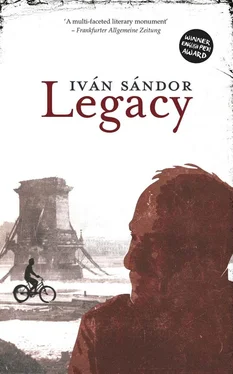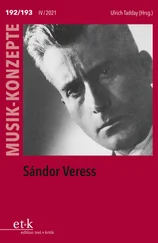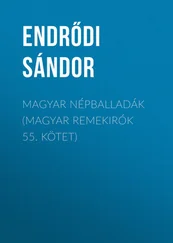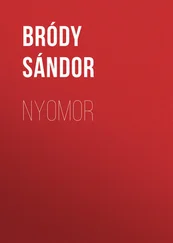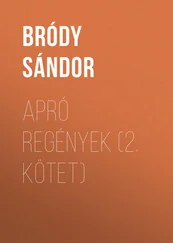When the captain had yelled out at the head of our column, as it stood ready to move off in the yard of the Óbuda Brickworks, that those aged sixty and over and those who were under sixteen could quit the ranks, and when Father adjusted my cap and Mother wound my scarf once more round my neck and told me what food was to be found in my haversack, and Father enumerated what documents and banknotes he had slipped into the pockets of my windcheater, and when the Róberts similarly said their farewells to Mádi and the gendarme NCO was lining us up, and Father shouted out names and addresses, Mother was looking at me as though she wanted her smile to live on as my lasting memory of those moments. I see them grasping each other’s hands and waving with their free hands as they reached the wooden gate and made a turn to the left. In all likelihood in the very last moment before the column disappeared Vera had spotted her mother’s face in the last row — or at least so she says.
Mrs Seidel is thirty-nine years old. She is wearing a black winter coat with an imitation astrakhan collar, high-heeled shoes and a dark-grey beret. When Vera joins the line of the elderly and children, she tells her to beware of you know what . Vera would like more than anything not to hear the same old warning, and Mrs Seidel concerns herself with the buckle on the strap of her haversack. Perhaps after that she looked for Vera, perhaps wishing to say something different and even waved, but I was no longer able to see her, and she almost certainly did not see me because I had ended up in the middle of the column. Yes, you were standing next to me; you must have been in the middle of the column, I say with my hand still resting on her nipple. The column had already reached the gate, and you shouted out to her, shouted out her name twice. You didn’t shout out Mummy, Mummy or Mother, Mother. Maybe that’s why I remember what you shouted out was Klári, Seidel Klári. The reason I shouted out Klári, Seidel Klári, she says, was because I reckoned that there were so many who were shouting out Mummy or Mother. Like I say, that’s what everyone was shouting. I saw her. She was walking in the last line, and she heard me calling out her name, says Vera. She turned round, I could see her face. I’m sure she saw me because she started waving, maybe even walked on tiptoe so that I should be able to see her. She had the look of someone who understood that they had to go whereas I would be staying. Her look was as if she had sensed that she would never see me again, and that was how I felt myself.
At the time even she could have no certainty about that, any more than you.
But that was what her expression was like, says Vera meekly. There was a postcoital satisfaction in her voice.
Maybe you felt like that only afterwards, I say. Maybe you only feel that way now that you have told me.
She draws her hand away from my crotch, and I draw mine away from her nipple. She embraces me.
I’m not saying while we embrace one another that I don’t recall Auntie Seidel’s look.
I let go of your hand and wanted to run to her.
Wanting to run to her mother but being unable to is a frequent subject of her dreams. She says that was what she dreamed about on the big table at Francia Road, and while in her dream she was helping me to pull down her knickers, she saw her mother as she was warning her to beware of you know what when she was thrilling from the touch of my hand. She had never felt it before, but she had heard about it from women friends; she had wanted the thrill to intensify. I was awake, she says, by the time I reached for your hand so you would keep it there, so it would be even better. But even then I still saw her, and that made everything which was good hurt so much.
I don’t tell Vera that her cry of pain on the table at Francia Road, as I withdrew my hand in terror and pulled out my handkerchief to mop myself, that her cry of pain I do remember.
You never talked about that kind of thing, I say.
That kind of thing cannot be spoken about. Your parents were so good with me, and it was also so good to be a sister, I never dared tell anyone before. Ever since then it always pops into my head just short of reaching a climax. I went to a sex psychiatrist, and he said it was understandable, far from unique, even used some technical term for it.
And you never even said anything about it to your husband?
He does everything as it is. I don’t want him to know why it is painful for me; he does not deserve that. It’s not his concern, it’s yours.
I stroke her eyelids with the palm of my hand and kiss her cheek.
That was a sibling peck, she says contentedly, eyelids closed. That was so nice, come on again, like that, more, more …

Ágnes occasionally makes notes while I talk about my memories of her stepfather, sometimes making notes even when I am not actually speaking. She takes it as natural for me also to make notes sometimes in the lobby on the diplomats’ table.
I note down that Vera experienced the joy of being able to forget when she was finally freed of the memory of her mother’s look. That’s what I tell Ágnes; yes, Vera and I were older than you and the chauffeur’s little boy. Vera was already having her periods.
She blushes.
Sorry, excuse me, I say. That truly does not belong to this discussion. Oh, goodness me! she says. Did her parents come back?
No, they didn’t …
What became of you two?
We were children … we drifted apart …
Vera’s only surviving relative was a great-aunt. She lived with her until she was twenty-one. I had to break free from her somehow, she says. She married her husband one week after meeting him.
She kneels on me. She moves slowly on me, then speeds up. She closes her eyes, I close mine.
Almost thirty years later Ágnes seems to be watching with interest as I make notes. After all, she is not exactly unfamiliar with what I am jotting down, how, at the time of meeting Vera again nearly twenty years after everything that had happened and sharing with one another what it was possible to share while we made love and clung to one another’s lips, we inhaled time into ourselves and sucked it out of each other, negated it. After all, Ágnes with her gentle smile is also wrestling with time, although in no way showing that for her, too, that was a struggle.
Thank you, Vera said again when she was lying beside me. I was dying to tell her how I had seen her body when she was a girl. Little beads of saliva appeared at the corners of her lips while she listened. My memories became part of her memories, the way we talked was as if she really did have an older brother and I a younger sister. The roles that had formerly been adopted out of necessity became a playground, even though both of us knew it was not that. When saying goodbye we had the feeling that everything repeats itself, although the fact that her mother’s gaze had robbed her of the chance of being able to find herself or that we should treat each other as siblings would not be repeated.

My first-floor room is in the left wing.
I stroll along red-carpeted corridors. In the hall are armchairs with plush blue covers, art deco mirrors and wall lamps.
The first shoot commences at ten o’clock tomorrow morning. There are seven of us from Budapest. Ágnes will be the last and would like to hear each interview from start to finish.
Without Carl Lutz those who will be recalling their memories in front of the cameras would not have been in a position to recall anything at all, although it would be wrong to keep the role of blind chance completely out of the picture — the unpredictable, perhaps the momentary hesitation of a black-jacketed submachine gunner. An example in my case is the fact that on seeing the two approaching submachine gunners on Francia Road I put my arms round Vera and pushed her against the wall as if there were no opportunity to snog anywhere else. What I gather from Ágnes’s expression on the terrace is although she, too, had been invited to conjure up her recollections, for her that was the least important aspect — it was more as if she were on a pilgrimage in our company.
Читать дальше
